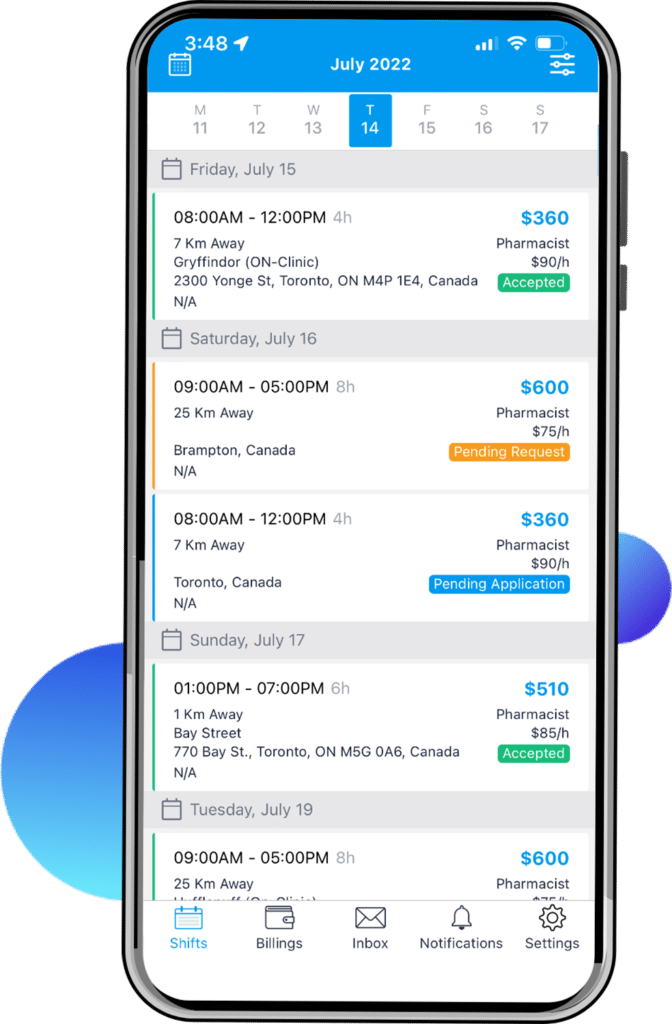
Which Medical Careers Are Most in Demand?
Trending in-demand medical careers include pharmacists, CT techs, EMTs, and more. Compare salaries and duties to choose the best healthcare job.

Are you considering a rewarding career as a pharmacist? Do you want to know more about a day in the life of a pharmacist and what you can expect during a typical shift? If you’re ready to learn more about what it's like to be a pharmacist, read on.
A day in the life of a pharmacist involves many different duties, most of which center around patients. When a pharmacist is on shift, they are usually the main person in charge. This means they are responsible for all type of work tasks, including:
Even though you may have lots of tasks to complete everyday, the majority of your time will be spent on patient care — a pharmacy can’t function without patients! Let’s take a deeper look into some of a pharmacist’s daily responsibilities.

Patients are the heart of any pharmacy and your job as a pharmacist is to ensure that they have a positive interaction every time. One of the best ways to do this is through medication consultations.
When you are working as a pharmacist, you are responsible for making sure each patient gets the right medication and that they understand what they are taking. You need to provide these consultations every time a patient fills a new prescription, although most pharmacists still check in with a patient at every refill.

During a medication consultation, you need to verify the following information:

You should also discuss:
Finally, you need to answer any questions the patient may have. Patients rely on your knowledge and expertise when it comes to their prescription information, so take time to ensure they are comfortable with their medication before leaving the pharmacy.
One of the most important responsibilities of a pharmacist is to pay attention. You are helping keep people healthy — and sometimes alive — with the medications that you dispense. This means you need laser-like focus to ensure you are pulling the right medication and putting the right dosage information on every prescription.
Providing the wrong medication or listing an incorrect dosage can potentially lead to severe reactions, medication overdoses, and even death. In the case of a dispensing error, a pharmacist could be held liable for medical malpractice, lose their job, and lose their license. To avoid these issues, careful attention must be paid to every prescription filled.
Another daily pharmacist duty is maintaining detailed patient records. These records contain important patient information, including:
Patient records must be maintained and kept up-to-date at all times. This information helps pharmacists make prescription decisions, including whether:
“Record keeping is part of the office tasks that pharmacists do everyday.”
Record keeping is part of the office work that pharmacists do every day. If records are not updated after a patient visits, their information could be misleading the next time they fill a prescription, which can lead to potential problems.
In most cases, a pharmacist can expect to work 40 hours per week. Those hours can cover night shifts, weekends, and even holidays, depending on where you are working. Pharmacy shifts can also vary, with some pharmacists working five 8-hour shifts and others working four 10-hour shifts. Other work hours can vary based on your retail or hospital location.
A retail pharmacy is located within another business — usually a retail store. Stand-alone pharmacies can also be considered retail pharmacies since they sell over-the-counter medications that aren’t pharmacy specific. Retail pharmacies can maintain opening hours that run outside of the host store’s hours, and are usually open 10 hours a day.
A hospital pharmacy is located within a hospital to fill prescriptions for patients after surgery or for other reasons. Hospital pharmacies are typically open 24/7, so you can expect to work on a rotating schedule with other hospital pharmacists.

When a pharmacist needs to miss multiple shifts, a locum or relief pharmacist is needed. These pharmacists have all the same education, training, and qualifications as regular pharmacists but their hiring contracts are handled differently.
Locum pharmacists work on a freelance basis, which means they have to contact pharmacies and offer their services to get shift work. Relief pharmacists are partnered with a job-matching site or staffing agency and are matched with jobs via these avenues.
If you are working as a pharmacist and need time off, consider hiring a locum or relief pharmacist to cover your shifts. You’ll gain peace of mind that licensed, experienced pharmacists are covering the pharmacy and your patients get consistent, uninterrupted service.
As a pharmacist, your job can be extremely rewarding as you help others throughout their health journey. You’ll experience a wide variety of situations and interact with different patient groups every day, which helps keep your job exciting and fulfilling.
If you aren’t ready to work as a full-time pharmacist but want to put your pharmacy degree to good use, consider becoming a relief pharmacist. You can sign up with ShiftPosts — the pharmacy matching app that helps pharmacists fill open shifts faster. When you sign up with ShiftPosts, you’ll get relief shifts faster and easier. Start your career as a relief pharmacist by contacting ShiftPosts today.


Trending in-demand medical careers include pharmacists, CT techs, EMTs, and more. Compare salaries and duties to choose the best healthcare job.

The future of pharmacies may be looking at an increasing number of prescription deliveries, but brick-and-mortar pharmacies aren’t leaving anytime soon.

The ShiftPosts co-founders bring decades of expertise from across the healthcare industry, and understand the critical importance of efficient healthcare scheduling of staff.


The role of a pharmacy manager includes overseeing staffing, supplies, and ensuring the pharmacy meets state and federal regulations.

If you are considering per diem work for your pharmacist relief shifts, know what working per diem means, along with its benefits and downsides.
Available for Pharmacy Owners
and Pharmacy Professionals
